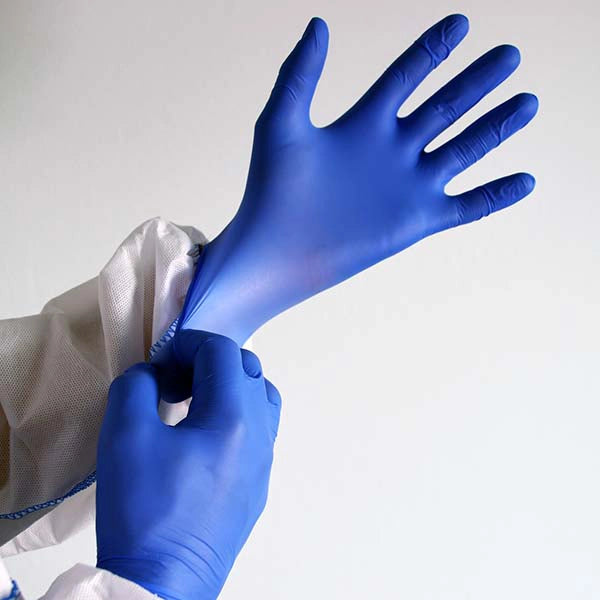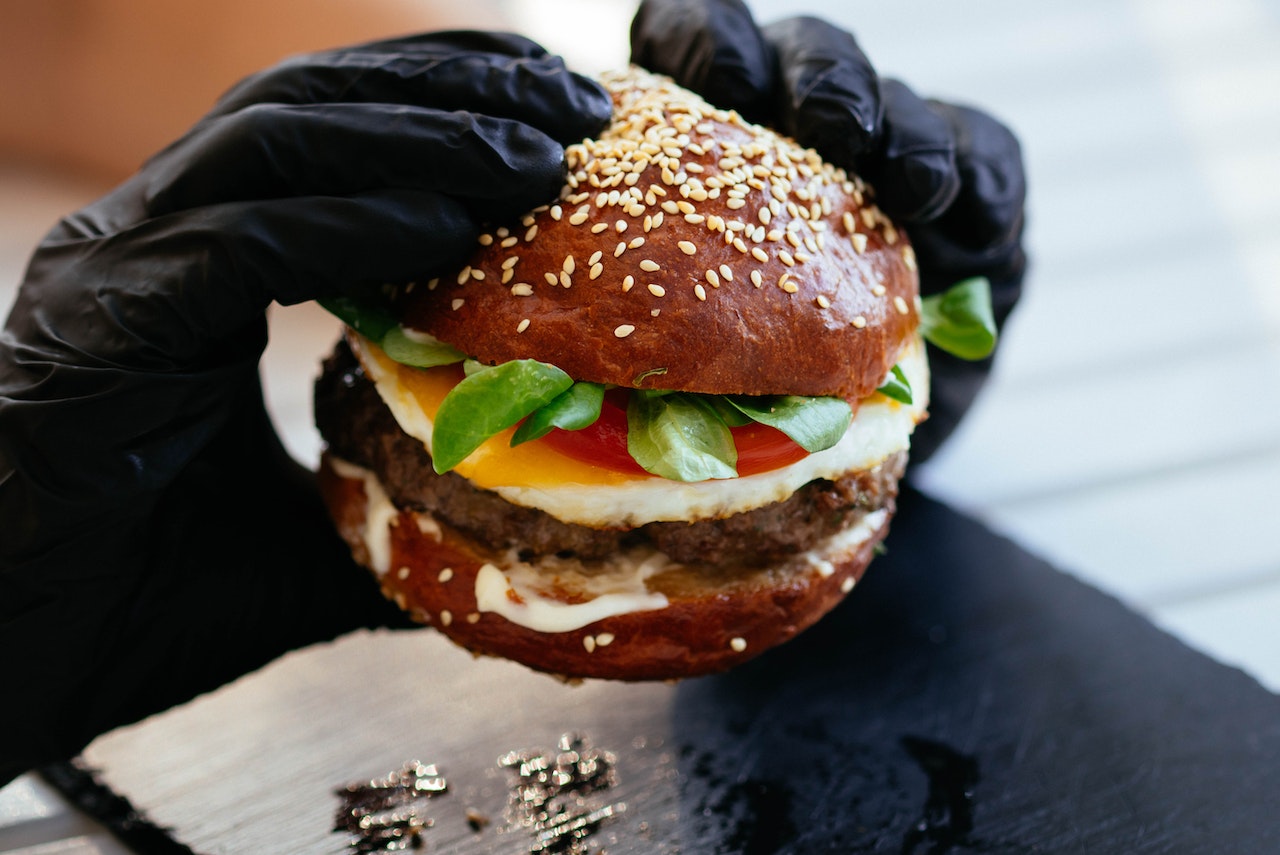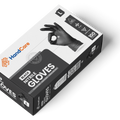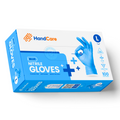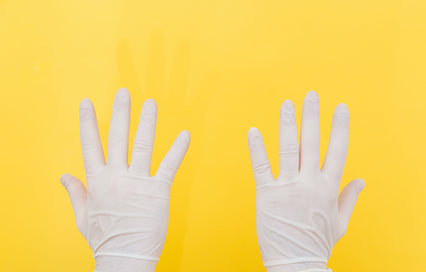Nitrile gloves are commonly regarded as one of the finest types of disposable gloves for assuring cleanliness. But are they safe for food preparation?
Yes! Nitrile is an appropriate material for food preparation. In fact, nitrile gloves are popular in food service because they’re flexible, hard to tear, unlikely to cause allergic reactions, and offer good protection against cleaning chemicals.
If you'd just like to buy nitrile gloves you know will be safe to use with food, check out our collection of food safe nitrile gloves.
Related: Best Disposable Gloves for Cooking
At a glance:
Why Are Gloves Necessary When Handling Food?
More than 2 million microbes cover the surface of the average human hand. Although hand washing helps eliminate some of these pathogens, disposable gloves are still required to prevent the spread of foodborne diseases.
In the extremely fast-paced food service business, handwashing standards are only sometimes strictly adhered to. While it shouldn't be an excuse, people frequently end up washing their hands in a hurry, especially when things become hectic. This hurried handwashing is one of the primary causes of cross-contamination, which frequently results in foodborne diseases, is hurried handwashing.
As a result, the FDA Food Code now mandates that all food workers wear disposable gloves. And not just any gloves; food-safe gloves are required.
Why Use Disposable Gloves For Food Safety?
For food handlers, a glove offers an easy, sanitary protective barrier between food and someone’s bare hands. It’s not a replacement for washing hands, but you no longer need to worry about any lingering germs--the gloves are already clean and ready for action. This safeguards clients from any pathogens or allergies that may be present on personnel's skin.
Changing a pair of gloves gives a food handler an easy way to transition between tasks. That way, they can don a clean glove each time and never have to worry about cross-contamination. By using separate pairs of gloves to handle raw meats and produce, personnel can reduce food contact, helping to prevent the spread of diseases such as salmonella. Plus, you don’t have to worry about employees slowing down to wash their hands for 20 seconds every time they switch tasks.
For the food handler, gloves also offer protection while completing their task. A good disposable glove is heat resistant and puncture resistant so that food handlers can safely chop and work on the stove without fear of injury, and supervisors can put employees to work without fear of contamination due to sharps injuries. In addition, gloves protect personnel from items that might irritate their skin, such as hot peppers, which can burn, and onions, which can leave lingering smells.
What Makes a Pair of Disposable Gloves Food Safe?
Globally, disposable gloves are an indispensable component of industrial kitchens. There are many types of disposable gloves on the market, available in a wide array of hues and materials including vinyl, latex, polyethylene, and nitrile. They are all used to prevent cross-contamination and as a barrier against dangerous substances.
However, the fact that they effectively remove other pollutants does not automatically make them food-safe.
Acceptable Quality Level
AQL is a quality standard for pinhole flaws. Manufacturers must test their gloves for pinhole faults and achieve an AQL of 2.5 or below. The lower the AQL, the fewer flaws there are in the gloves. A 2.5 AQL indicates that gloves must be made with fewer than 25 defects per 1,000 gloves.
510k Certification
The FDA grants a 510k certification to any producer whose product is deemed safe and effective. The 510k clearance can only be obtained by completing specific exams. Gloves must pass testing for puncturing, abrasion, elongation, and tension. The AQL is required for obtaining a 510k. Only gloves with a 510k certification are considered safe and fulfill food-safe gloves requirements.
Latex-Free
Despite the fact that latex-free gloves are not a statutory requirement for food safety, it is nonetheless crucial to consider. Historically, latex gloves were the most popular disposable gloves on the market.
👉 Shop Latex Free Gloves and save up to 50% today
However, as the rate of latex allergies rises, more individuals are attempting to avoid using latex gloves. Latex allergies harm more than just the individual wearing the gloves. If latex gloves were used during food preparation, there is a high likelihood that latex proteins will end up in the food.
Powder-Free
Cornstarch powder was frequently used to make putting gloves considerably simpler. In 2016, however, the FDA prohibited the use of powdered gloves. Despite being primarily prohibited for medical reasons, this precaution is also good for food safety. One of the primary reasons powdered gloves were outlawed was because they triggered allergic responses, particularly when used with latex gloves.
The latex proteins were thought to bind to the powder, and as the powder is easily spreadable, this facilitated the spreading of latex. The powder might be inhaled, resulting in irritation of the airways. In addition, the powder might easily contaminate the food that you are serving.
What to Look for in the Best Food Safe Disposable Gloves
Of course, not just any old pair of gloves will do the trick. A great food safety glove has certain qualities that make it unique from, say, an exam glove. Even gloves for someone preparing a sandwich require different protection than gloves for someone working with machinery or sharp objects.
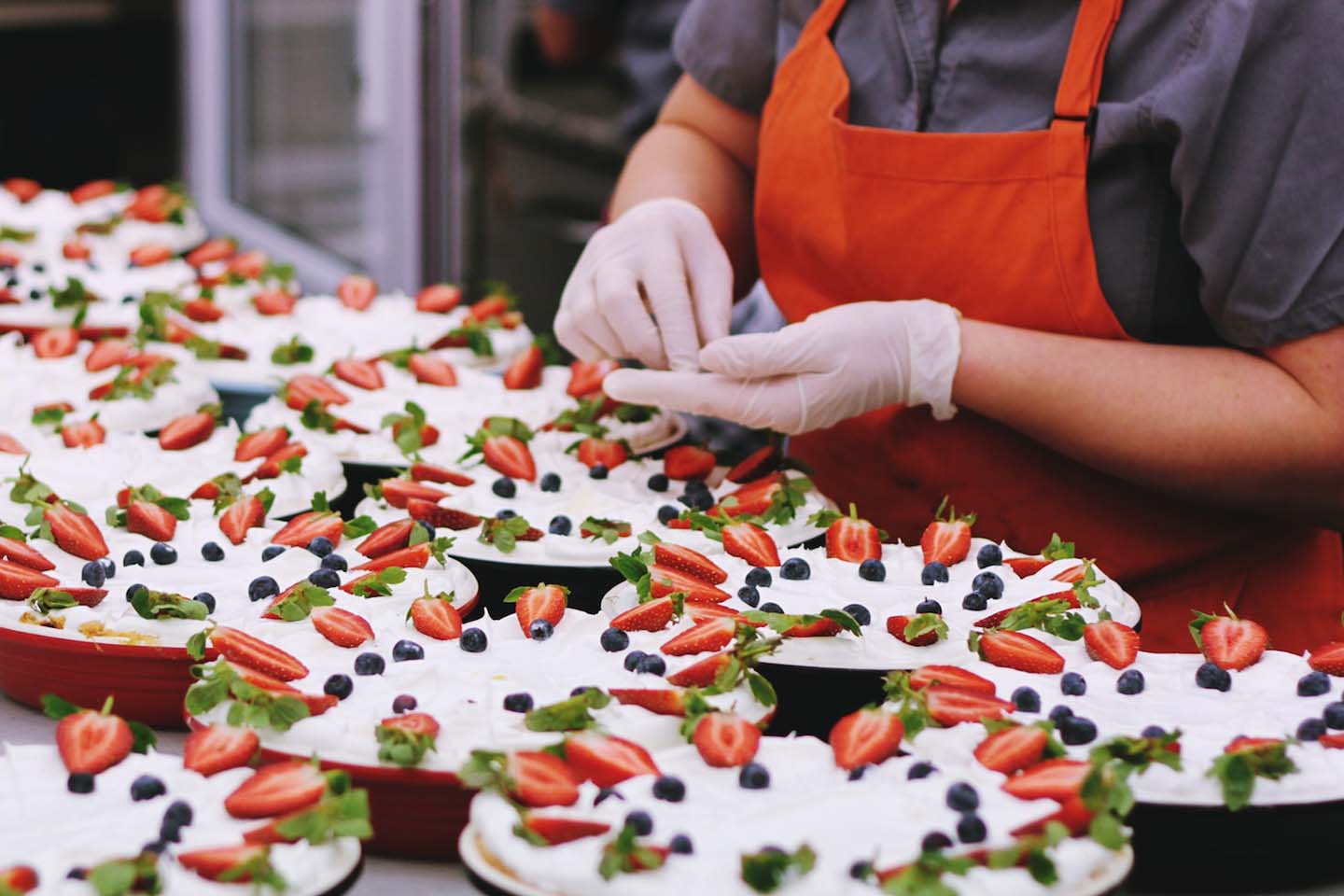
You need a glove offering dexterity, sensitivity, and protection. This type of glove would make sense for someone helping out in a restaurant kitchen, and it would perform quite well for other basic food prep tasks that don’t require puncture protection.
In that case, you’re looking for gloves that fit well to the hand and have excellent tensile strength (in other words, they don’t break easily when stretched). Gloves should also be highly heat resistant (after all, you are working with food!)
Are Nitrile Gloves Food Safe?
Yes, all nitrile gloves are safe for food handling. Nitrile gloves were designed to serve as an alternative to latex gloves. They’re manufactured from a synthetic substance known as nitrile butadiene rubber, sometimes known as synthetic rubber, and their popularity is growing. Nitrile gloves are food safe — in fact, they’re one of the best options for food handling. Here’s why:
Puncture Resistant and Heat Resistant
Nitrile is incredibly popular because of its remarkable tensile strength. It’s one of the most durable disposable glove materials on the market, especially thicker gloves made for food machinery. This makes nitrile impressively puncture resistant, which means it’s an excellent choice for food handlers.
Yet nitrile is also quite heat resistant. The material is made of natural rubber and holds its shape under significant stress, which means your team can always count on nitrile gloves to deliver protection when they need it.
Allergen Free
Another reason nitrile gloves take a front seat in food safe environments is that they’re naturally allergen friendly.
Unfortunately, you have no way of knowing what allergies a customer might have, which means your gloves have to be safe for any future consumer.
Since nitrile gloves are manufactured from synthetic rubber instead of natural rubber, they do not contain any latex proteins. These latex proteins cause all allergy responses and are exclusive to natural rubber. This means you never need to worry about allergic reactions. A well-designed nitrile glove will also be powder-free, cutting down on the risk of irritation and contamination.
Flexible
Like latex gloves, nitrile gloves offer a snug fit and excellent elasticity. They’re designed to be fitted, so food handlers won’t sacrifice any dexterity or tactile sensitivity when donning gloves. Perfect for adding the little touches that make your restaurant presentation stand out!
Chemical Resistant
In addition to protection from abrasions, rips, and punctures, nitrile gloves also offer resistance to water, oil, and solvents. They’ll work equally well for cooking, food service, and cleanup like dishwashing, while keeping your hands dry and free of grease.
These characteristics also make nitrile gloves perfect for handling a variety of meals, from fresh fruits and vegetables to raw meats. They keep the user safe while preventing them from contaminating food and creating foodborne diseases.
Are Blue Nitrile Gloves Food Safe?
Yes, blue nitrile gloves are food safe and are commonly used in the food service industry. Nitrile gloves, including blue ones, are made from synthetic rubber, which makes them free from latex proteins that can cause allergic reactions. This makes them an excellent choice for food handling and preparation.
Blue nitrile gloves are particularly popular because their color makes it easy to identify if a piece of the glove has torn and contaminated the food, enhancing food safety. These gloves provide a strong barrier against contaminants, are resistant to punctures, and offer good dexterity, making them suitable for various food-related tasks.
👉 Shop Blue Nitrile Gloves and Save Up To 50% Today
Additionally, blue nitrile gloves comply with FDA regulations for food contact, ensuring that they are made from materials that are safe to use with food. They also resist chemicals and oils, making them versatile for use in different food preparation environments.
FDA Requirements for Gloves in Food Preparation
The Food and Drug Administration (FDA) Food Code mandates that personnel use gloves or utensils while handling "ready-to-eat" foods. Food contact gloves are governed by Title 21 CFR Part 177 of the FDA, which states that authorized gloves must be composed of a material "generally recognized as safe for use in food and food packaging." Nitrile gloves are FDA approved food handling gloves.
Buy Your Nitrile Gloves for Food with gloves.com
Nitrile gloves are widely regarded as one of the best types of disposable gloves for maintaining cleanliness and safety. They are highly suitable for food preparation due to their flexibility, durability, and low likelihood of causing allergic reactions. Additionally, nitrile gloves provide excellent protection against cleaning chemicals, making them ideal for use in food service.
If you need nitrile gloves that are safe for food handling, check out our collection at gloves.com. Our selection ensures that you have access to high-quality, food-safe nitrile gloves that meet all necessary safety standards. Visit gloves.com today to find the perfect gloves for your food preparation needs.
Are Nitrile Gloves Food Safe: Frequently Asked Questions
Can you use vinyl gloves for food prep?
Yes! Vinyl gloves work as a less expensive option for food service, but they are less durable than latex or nitrile gloves and prone to tears.
Can you use latex gloves for food prep?
Latex gloves are appropriate for food preparation as long as they are non-powdered. The powdered form of latex gloves may cause respiratory problems and other adverse health effects.
What gloves are not food-safe?
Gloves that are not food-safe include those made from materials that can break down or leach chemicals into food. Examples include latex gloves, which can cause allergic reactions, and powdered gloves, which can contaminate food with the powder. Additionally, gloves that do not meet FDA standards for food contact, such as those with high levels of pinhole defects or made from materials not recognized as safe for food handling, should not be used in food preparation.
When should you not use nitrile gloves?
You should not use nitrile gloves in situations where high sensitivity to touch is required for very delicate tasks, as they are generally thicker than latex gloves and may reduce tactile feedback. Additionally, avoid using nitrile gloves if you or the people you are serving have a known sensitivity or allergy to the compounds used in nitrile gloves. In such cases, alternative materials like vinyl or polyethylene gloves may be more appropriate.

